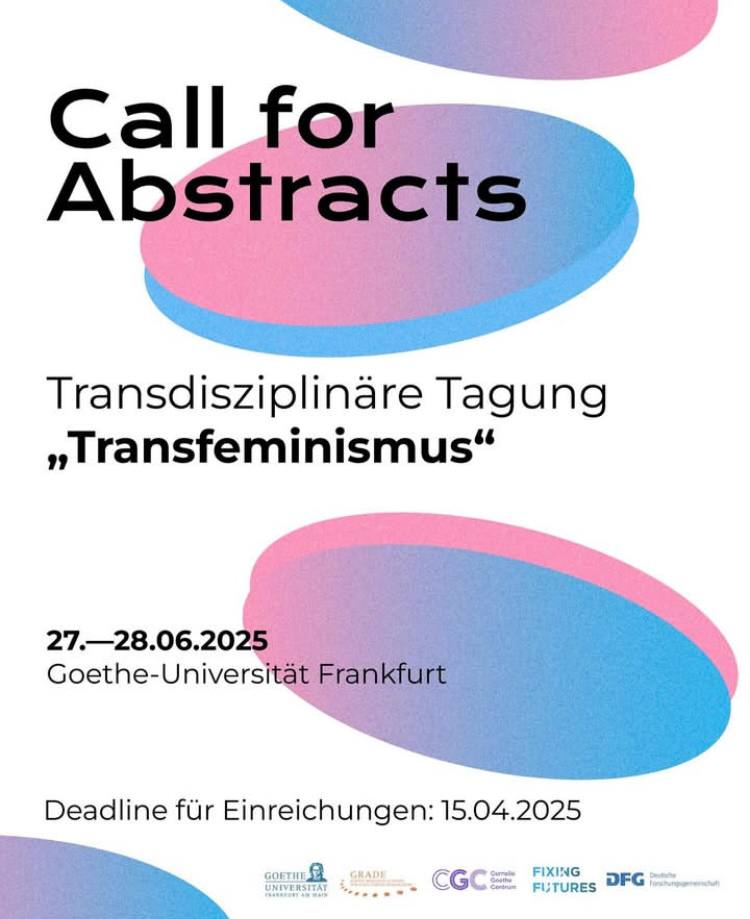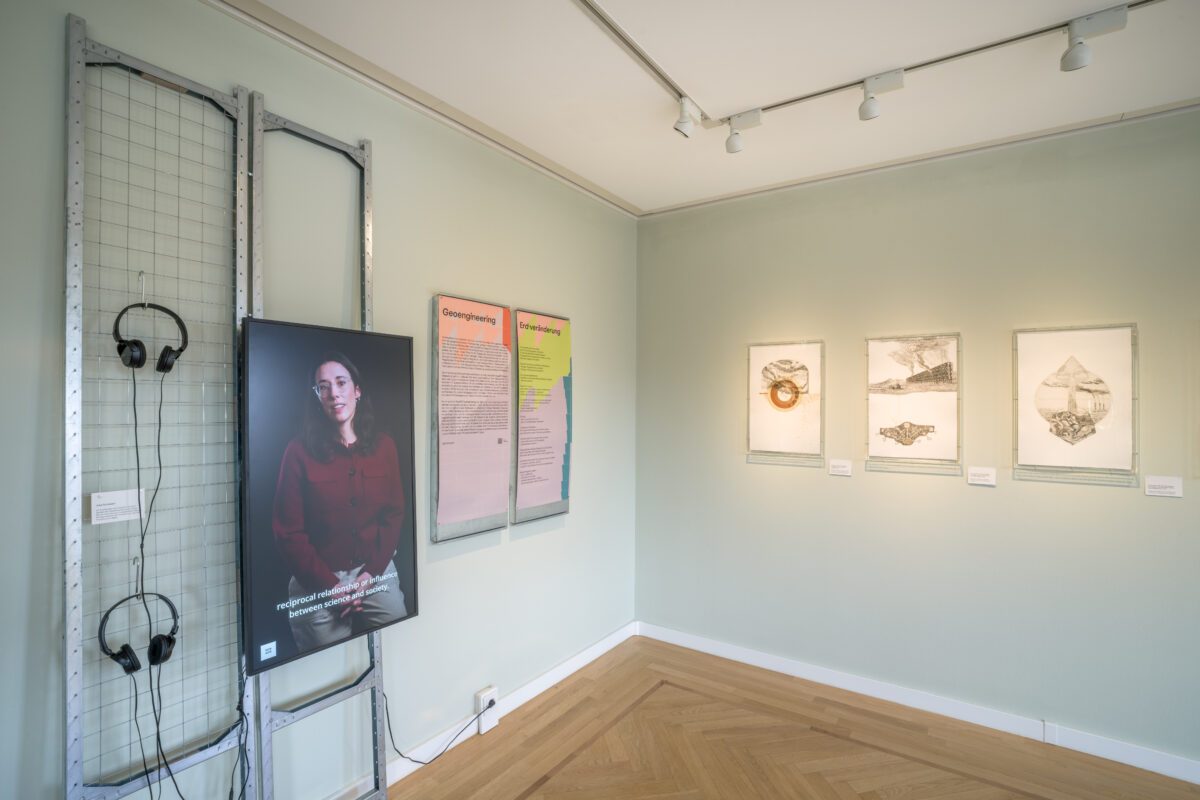Transdisciplinary Conference on Transfeminism
Transdisziplinäre Tagung vom 27.06. bis zum 28.06.2025 der GRADE Initiative „Trans Studies“ an der Goethe-Universität Frankfurt am Main, in Kooperation mit dem Cornelia Goethe Centrum und dem DFG-Graduiertenkolleg „Fixing Futures“

Trotz zunehmender Auseinandersetzungen nehmen transfeministische Perspektiven an deutschsprachigen Universitäten eine marginalisierte Rolle ein. Die Tagung „Transfeminismus“ hat zum Ziel, dieser Marginalisierung entgegenzutreten. Wir wollen den Stand transfeministischer Perspektiven im deutschsprachigen Raum ausloten, mit Blick auf Verbindungslinien und Differenzen zu internationalen Diskursen sowie auf vergangene, gegenwärtige und zukünftige Herausforderungen. In der Tradition transfeministischer Kämpfe steht die Tagung an der Schnittstelle von Wissensproduktion und kollektiver Praxis, mit dem Ziel, Antworten auf politische, institutionelle und epistemische Einengungen, Marginalisierungs- und Gewaltformen gegenüber transfemininen, von Rassismus und Ableismus betroffenen, sexarbeitenden und ökonomisch prekarisierten Körpern zu finden.
—
Seeing the Unforeseeable: Art, Science, and the Imagining of Futures
14.06.2025, Symposium for the MGGU exhibition: Fixing Futures: Planetary futures between speculation and control
How can art and science help us to imagine futures that are not yet visible? In a multidisciplinary symposium, the RTG’s Dr. Steven Gonzalez and Dr. Julia Schubert bring together renowned artists and scientists to discuss speculative visions, technological utopias and the responsibility for planetary futures. The focus is on the interactions between art, science and technology and the new perspectives that arise from their collaboration.

Program:
14:00 – Panel discussion with Q&A
Dr. Steven Gonzalez and Dr. Julia Schubert (University of Frankfurt) in conversation with Jordan Rita Seruya Awori (artist), Prof. Dr. Bodhisattva Chattopadhyay (University of Oslo), Prof. Dr. Mi You (University of Kassel) and Dr. Joshua Wodak (Western Sydney University)
16:00 – Dialogue tour through the exhibition „Fixing Futures“ with Jordan Rita Seruya Awori and Joshua Wodak
18:00 – Keynote Lecture
Prof. Dr. Bodhisattva Chattopadhyay (University of Oslo)
Language: English
Admission free
Rregistration required: anmeldung@mggu.de
Location: Museum Giersch der Goethe-Universität (directions)
—
27.09.2024, 09:00 am – 12:30 pm
Missing, Underappreciated, Found. Thinking about ethnographic objects.
How do we think with missing, underappreciated, and found ethnographic objects? What role do transitional knowledge devices play in conjuring ethnographic insights? In this workshop we will examine the transitional devices that ethnographers encounter or produce in their work to conjure their research projects. The aim is to dwell in the affordances of these ethnographic tools (satellite maps, databases, quantitative models, etc.) as they sit in the midst of established forms of ethnographic fieldwork, i.e. participant observation and interviews.
At a time when ethnographers increasingly address multi-scalar data and phenomena, multi-species concerns, and geological questions, ethnographic experiments mushroom. These experiments often have at their core transitional devices that focus our attention to open new lines of inquiry, although they can also limit the creative potential of ethnographic work. We will think with these devices, highlighting the pragmatic implications of their making and use as well as their connection to the research questions that collective projects pursue. Ultimately, rather than take these devices for granted as aesthetic or political objects, the question we want to explore is what specific uses are they put to in concrete research projects.
At the workshop three research teams will present work in progress: Labyrinth (UCLA), Tracing Data Politics (Goethe University), and Expanding the Social World Downwards (USC).
This workshop is organized as part of the collaboration between the Ethnography Studio and the Research Training Group Fixing Futures at Goethe University Frankfurt.
*Please note: The workshop will not take place in Frankfurt, but at the University of Southern California.*
—
07.03.24, 10 a.m. – 7 p.m.
Symposium: Living Techno-Natures: Biohybrid Objects, Life, and Technology
Organized by Dr. Josef Barla (Goethe-University Frankfurt; Fixing Futures) and Dr. Marco Tamborini (TU Darmstadt)
Proposing the notion of “biohybrid objects” for complex systems consisting of natural and
artificial components that not only imitate living beings but also share their basic principles,
this symposium explores the remarkable circulation of morphological knowledge between
biology and technology. Bringing together innovative interdisciplinary contributions, the
symposium aims at bringing together insights on the emergence and nature of biohybrid
objects form philosophy, epistemology, and science and technology studies. After a series
of breakthroughs in synthetic biology and artificial intelligence, how can we still distinguish
philosophically, scientifically, and epistemologically between living beings and technologies?
In what ways do biohybrid objects both inform and challenge established understandings of
life and technology? What does it mean to shift our understanding from organisms as objects
of knowledge to biohybrid objects, i.e., to natural-technological assemblages that do not
exist in isolation from interventions in science and engineering and economic practices?
What epistemological adjustments are necessitated by the shift in biology from organisms
as objects of knowledge to organisms as problems of genetic coding and access to
information, but also by recent reworking of organisms to technologies themselves? How
are biohybrid objects not only technoscientificially produced but themselves reconfiguring
science, engineering, and the bioeconomy? Engaging with these and other crucial questions
that emerge from the dissolution of the boundaries between life and technology, the
symposium will contribute to current debates in philosophy, epistemology, and science and
technology studies that explore the relationship between life and technology against the
backdrop of fundamental shifts brought about by synthetic biology and artificial intelligence.
With a keynote lecture from Henry Dicks (University Jean Moulin Lyon 3) on nature-culture dualism in biomicry as well as different panels on
1. Machinic Life: Philosophical Perspectives on Bioinspiration (with Julia Rijssenbeek, Marco Tamborini, Josef Barla [Fixing Futures] and Christoph Hubatschke)
2. Re/Generating Life: Biohybrid Approaches and Technological Promises (with Gabriele Gramelsberger, Louisa Estadieu and Fiorella Battaglia)
3. Simulating Life: Ethics, Practices, and Boundaries of Artificiality (with Steven Gonzalez Monserrate [Fixing Futures], Dominika Lisy and Hannah Link)
For further information on the timetable and contents, please see the symposium programm.
